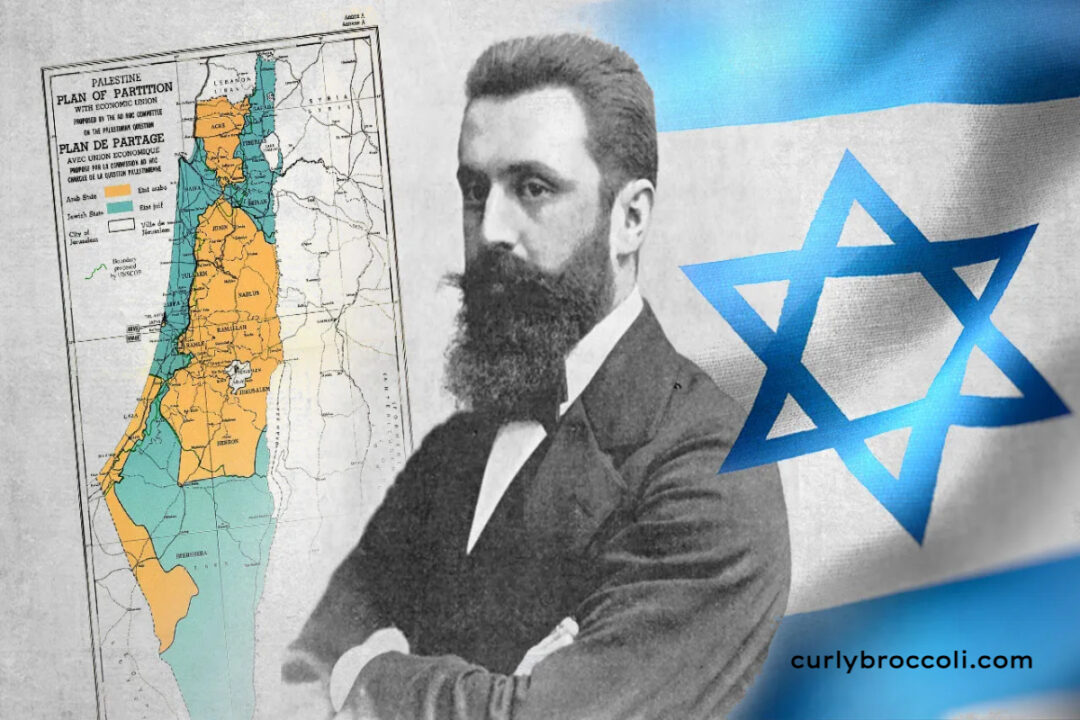Zionism, a term deeply rooted in the 19th century, has since become one of the most significant ideologies in modern history. While many encounter the word in various contexts, the precise definition and its implications can be elusive. Understanding Zionism, especially as defined in the dictionary, requires delving into its historical, ideological, and political underpinnings.
Understanding Zionism: The Definition
At its core, the dictionary definition of Zionism refers to the movement for the re-establishment, development, and protection of a Jewish nation, primarily in what is now Israel. The term “Zion” itself is a biblical reference to Jerusalem, symbolizing the historic land of Israel. Over time, Zionism evolved from a religious aspiration into a political movement, culminating in the establishment of the State of Israel in 1948.
You Might Also Like: Dalton’s Atomic Theory: The Cornerstone of Modern Chemistry
Historical Origins of Zionism
The roots of Zionism trace back to the late 19th century, during a time when Jews across Europe faced significant persecution. The rise of nationalist movements across the continent led Jewish intellectuals and leaders to consider the idea of a return to their ancestral homeland. Theodor Herzl, often regarded as the father of modern Zionism, was pivotal in promoting the idea that Jews needed a state of their own to escape the cycle of anti-Semitism that plagued their communities.
Herzl’s 1896 pamphlet, Der Judenstaat (The Jewish State), articulated the need for a Jewish homeland, laying the foundation for what would become a global movement. Herzl’s vision was that of a secular, political state for Jews, a significant departure from the traditional, religious yearning for the Messiah to lead the return to Zion.
The Evolution of Zionism
Zionism as an ideology has evolved significantly since Herzl’s time. Initially, the movement was largely secular, focusing on the establishment of a Jewish state as a safe haven from persecution. However, as Zionism gained momentum, it diversified into various streams, each interpreting the vision of a Jewish homeland differently.
Political Zionism emphasized the need for diplomatic and political action to secure international support for the establishment of a Jewish state. Labor Zionism, on the other hand, believed in building the state through collective agricultural labor and the establishment of socialist communities known as kibbutzim. Cultural Zionism, championed by figures like Ahad Ha’am, emphasized the revival of Jewish culture and the Hebrew language as central to the Zionist project.
Religious Zionism merged traditional Jewish beliefs with the nationalist ideology, arguing that the return to Zion was a fulfillment of biblical prophecy. Today, Zionism continues to manifest in these various forms, reflecting the diverse nature of Jewish thought and identity.
Zionism in the Modern Era
With the establishment of Israel in 1948, Zionism achieved its primary goal. However, the movement did not end there. Modern Zionism now focuses on the development and protection of Israel as a Jewish state, as well as the immigration of Jews from around the world to Israel, known as Aliyah.
The term Zionism has also become a point of contention in international politics. For supporters, Zionism represents the self-determination of the Jewish people and the right to a secure homeland. However, critics often associate Zionism with colonialism and the displacement of Palestinian Arabs during the creation of Israel. This dual perception has made Zionism one of the most debated ideologies in contemporary discourse.
The Controversy Surrounding Zionism
The controversy surrounding Zionism largely stems from the Israeli-Palestinian conflict. Critics argue that the Zionist project led to the displacement of hundreds of thousands of Palestinian Arabs during the 1948 Arab-Israeli War, an event they refer to as the Nakba (catastrophe). These critics view Zionism as a colonialist and expansionist ideology that prioritizes Jewish rights at the expense of Palestinian Arabs.
Supporters of Zionism, however, argue that the movement was a legitimate response to centuries of anti-Semitic persecution. They point out that Jewish communities had a historical and religious connection to the land of Israel, and that the establishment of a Jewish state was necessary for their survival. Furthermore, they argue that the Israeli-Palestinian conflict is complex and that Zionism itself should not be blamed for the ongoing tensions.
Zionism and Jewish Identity
For many Jews, Zionism is not just a political movement but a key component of their identity. The establishment of Israel has provided a sense of pride and security, reinforcing the idea that Jews have a place to call their own. The concept of Aliyah, or the return to Israel, is seen by many as a fulfillment of biblical prophecy and a personal connection to their ancestral homeland.
However, not all Jews identify with Zionism. Some, particularly in ultra-Orthodox communities, oppose the modern state of Israel on religious grounds, believing that the establishment of a Jewish state should be left to the coming of the Messiah. Others, particularly among younger, progressive Jews, struggle with the ethical implications of Zionism in light of the Israeli-Palestinian conflict.
Zionism in the Dictionary: More Than a Definition
When we look up Zionism in the dictionary, the definition provides a concise explanation of the movement’s primary goal—the establishment of a Jewish state. However, this definition only scratches the surface. The term encompasses a wide range of beliefs, aspirations, and historical contexts that have shaped Jewish identity and the politics of the Middle East.
Understanding Zionism requires not just a look at its dictionary definition but also an exploration of its history, its ideological diversity, and its impact on both Jews and non-Jews. As with many complex ideologies, Zionism cannot be fully captured in a single sentence. It is a dynamic and evolving movement that continues to influence global politics and Jewish identity.
The Future of Zionism
As we look to the future, the role of Zionism in Jewish and global affairs remains significant. The challenges facing Israel, including security concerns, demographic shifts, and the ongoing Israeli-Palestinian conflict, will continue to shape the Zionist movement. Furthermore, the global Jewish diaspora will play a crucial role in defining what Zionism means in the 21st century.
Will Zionism remain focused solely on the survival and prosperity of Israel, or will it evolve to address broader issues of social justice, equality, and peace in the region? These questions are at the heart of ongoing debates within the Jewish community and beyond.
Zionism Definition in Popular Culture
In popular culture, Zionism is often depicted in various ways, reflecting the diverse opinions and controversies surrounding the ideology. Films, literature, and media portray Zionism from different angles, sometimes emphasizing the heroic struggle for a Jewish homeland, while at other times critiquing the movement’s impact on Palestinians.
These portrayals influence public perception, making it crucial to approach the term with a nuanced understanding. The dictionary definition provides a starting point, but it is the deeper exploration of the movement’s history, ideology, and impact that truly illuminates what Zionism represents.
The term “Zionism” encapsulates a complex and multifaceted ideology that has played a crucial role in shaping modern history. While the dictionary definition offers a concise explanation, the full understanding of Zionism requires an exploration of its historical roots, ideological diversity, and ongoing impact on global politics and Jewish identity.
As we continue to grapple with the implications of Zionism, both in Israel and the wider world, it remains a topic of profound importance and debate. Understanding its nuances is essential for anyone seeking to comprehend the broader context of Middle Eastern politics and the Jewish experience.
FAQs
What is the dictionary definition of Zionism?
Zionism is defined as the movement for the re-establishment, development, and protection of a Jewish nation in what is now Israel.
Who founded modern Zionism?
Theodor Herzl is often credited with founding modern Zionism, particularly through his 1896 pamphlet Der Judenstaat (The Jewish State).
How has Zionism evolved over time?
Zionism has evolved from a primarily secular political movement to include various streams, such as Labor Zionism, Cultural Zionism, and Religious Zionism.
Why is Zionism controversial?
Zionism is controversial primarily because of its association with the Israeli-Palestinian conflict, where critics view it as a colonialist movement that displaced Palestinian Arabs.
What is the role of Zionism in modern Jewish identity?
For many Jews, Zionism is a key component of their identity, symbolizing the connection to Israel and the Jewish people’s right to self-determination. However, opinions on Zionism vary widely within the Jewish community.
What is the significance of Aliyah in Zionism?
Aliyah refers to the immigration of Jews to Israel, a concept central to Zionism, as it represents the return to the Jewish ancestral homeland.





